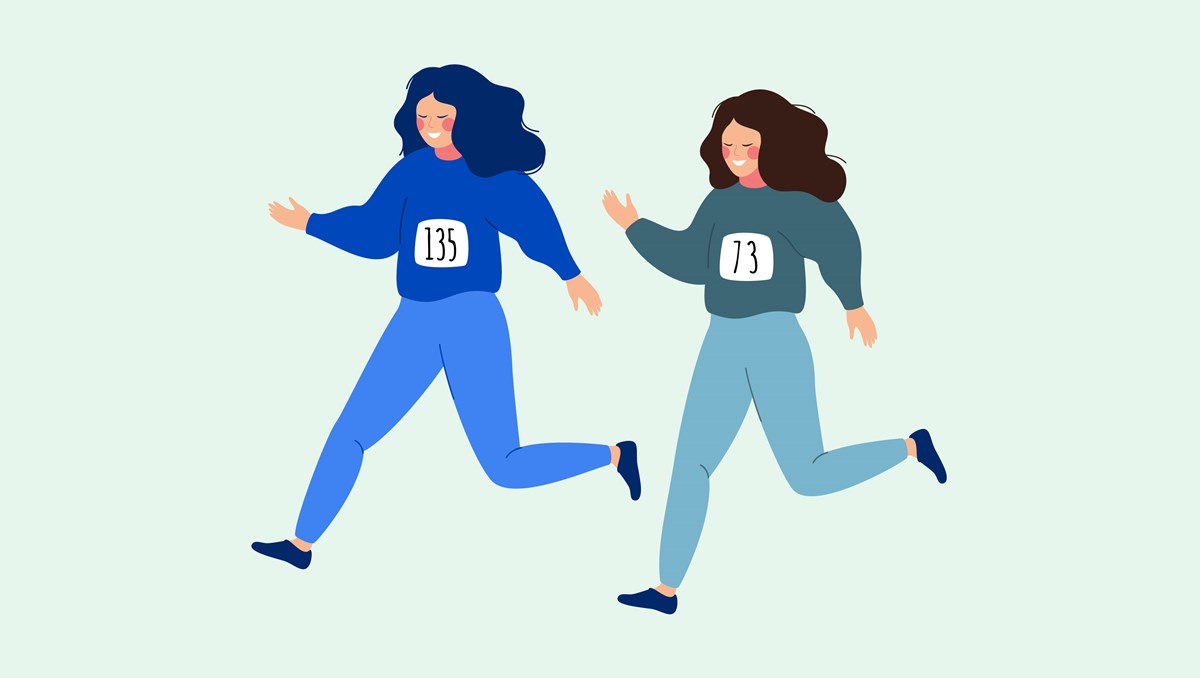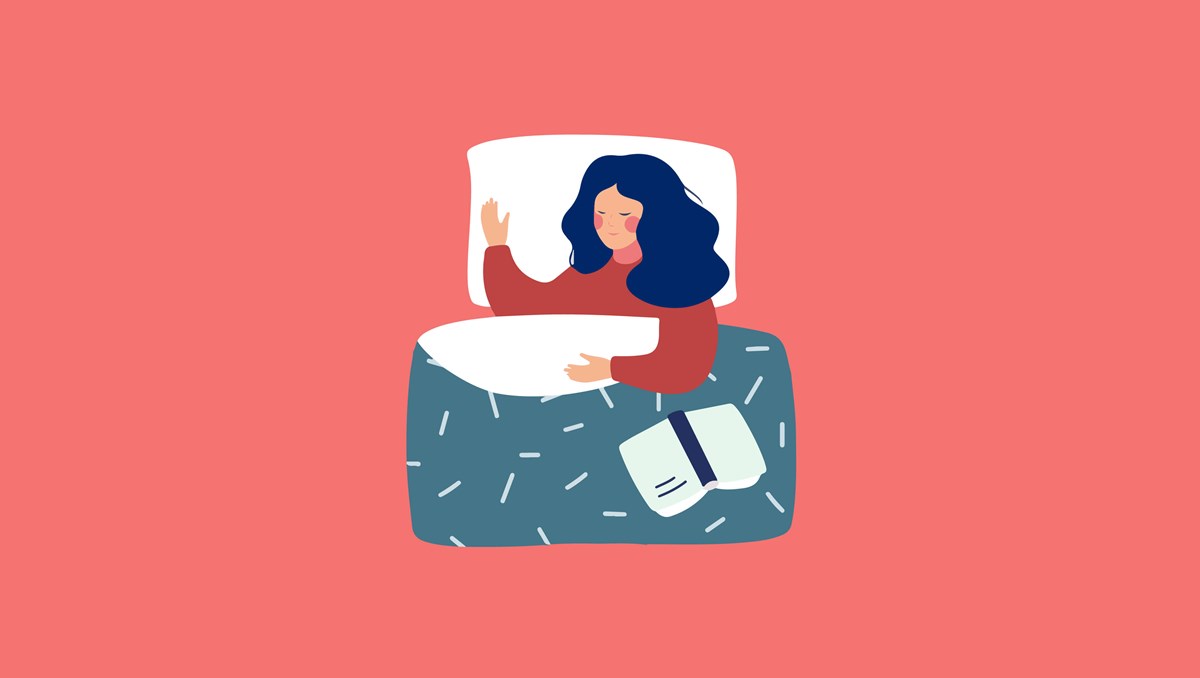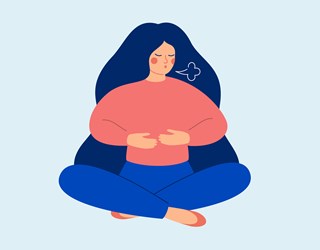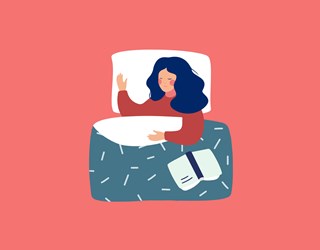The building blocks of good mental wellbeing
Teachers and education staff, you can create healthy habits and a lifestyle that supports your mental wellbeing through a few simple steps taken at your own pace.
Guides / 12 mins read

Everyone can do three things for good mental wellbeing:
The benefits that come with all three are powerful and, combined, can also help ease symptoms of mental illness. In some cases, they can even prevent disorders from developing.
Teachers and education staff can create healthy habits and a lifestyle that supports your mental wellbeing through a few simple steps taken at your own pace. Be kind to yourself and remember that you might not find it easy to accomplish everything each week – but that’s ok!
Exercise and your mental health
As well as the physical benefits, exercise can help improve sleep quality, energy, and mental health. Movement is also a powerful way to reduce the risk of developing mental illness and easing symptoms. This includes depression, anxiety, Post-Traumatic Stress Disorder (PTSD), panic disorder, and Attention-Deficit/Hyperactivity Disorder (ADHD).
With many benefits, it’s clear to see why exercise is great for boosting your mental health. In some cases, exercise is prescribed as a treatment for mental illness.
But remember, you don’t have to run a marathon tomorrow – or at all! – focus on finding a way of moving your body that feels good.
- A sense of achievement: Getting regular exercise that becomes a habit can feel incredibly rewarding. Over time, you’ll build a sense of self-worth, making you feel more confident and stronger (mentally and physically). The beauty of movement is that even the smallest of activities will leave you feeling better.
- Decreased stress: Exercise reduces stress hormones (like cortisol) while increasing endorphins, giving you a natural boost.
- Improved focus and memory: Those feel-good endorphins also help with concentration. Physical movement stimulates the growth of new brain cells, which can help prevent memory loss. You might find that while exercising, you’re distracted from intrusive thoughts and negative emotions. Some find physical activity a positive way to take their mind off worries.
- A great way to connect: Having support helps ease the load of mental health challenges and illness. So, taking part in a class or signing up for a team sport is a great way to feel you’re not isolated, all while you get your dose of mood-boosting endorphins.
- Better confidence: With the physical benefits coming into play, you might find a new sense of confidence. You may have more of a glow, a better posture, and a more vital stride. You may feel more confident in your own skin.
- Sounder sleep: Any movement in the day can help with regulating sleep patterns. For evenings, try relaxing activities such as stretching or yoga – you can find specific stretches or postures online that will help promote better sleep.
- More energy: Getting your heart pumping will give you a natural boost. Over time you’ll likely see you generally have more energy. This extra energy is helpful when you find it hard to get moving and lack motivation.
- A healthy habit: Exercise can help build resilience to life’s challenges and be a healthy way to cope with symptoms of mental illness. Movement is one of the most effective things to keep in your treatment toolbox.

Overcoming obstacles
The great thing about exercise and mental health is that you don’t need to spend hours training in the gym or running marathons to reap the benefits of physical activity. Regular but straightforward movement can go a long way, and even a tiny bit of exercise is better than nothing. Don’t underestimate the positive effects of a nice walk!
But for many living with mental health challenges of illness, exercising can be a daunting prospect. You may not have the energy to get up, or you’re too nervous about joining a class, or not interested in doing anything at all. This hesitation is completely understandable.
And even when you know all the benefits that exercise brings, taking the first step to doing it is easier said than done. Here are some common barriers and how you can get past them.
- You feel exhausted
Sometimes, you don’t have the energy, and the last thing you want to do is put on your kit and exercise. But, as mentioned before, exercise makes you feel more energised. Set yourself a goal of a 5-minute walk, and the chances are that once you start moving, you’ll find you’re ok to keep going. - You feel overwhelmed
When you’re stressed or depressed, adding another activity to an already busy day can feel overwhelming and become a burden amongst other commitments. Try viewing movement as a priority and something you do for yourself. Be strict with prioritising this time. It doesn’t have to be hours of training, even 15 minutes will help. - You feel hopeless
You might be finding that nothing is worth doing and you’re not able to exercise. It’s best and ok to start slow and to go at your own pace. To begin with, try a walk or a gentle stretch for a few minutes a day, then slowly build yourself up. Remember, the more you exercise, the more confident you’ll become. Start small. - You feel bad about yourself
Low self-esteem can stop you from achieving what you want to. It helps to set a realistic and achievable schedule for your age, weight, emotions, and lifestyle. Again, start slow and when you reach your goals, reward yourself for everything you have achieved. - You are in pain
Before starting any new exercise programme, you should always consult your GP. If you feel pain, you should talk to your doctor about ways to safely exercise so that you can still move, but in a way that is best for you. A gentler option like yoga might be the place to start.
How to get started
- Start small
If you set unrealistic goals, you’ll only feel worse if you don’t meet them than when you started. Set achievable milestones that you can tick off along the way and build up to bigger ones over time. - Exercise when you know you’ll have energy
Some people are spritely in the morning, while others have a second wind in the afternoon or evening! Find a time in the day to exercise that works for you. Don’t feel pressured to wake up at dawn to complete a 5k run. You can take a 15-minute walk any time of day. The crucial thing is to do what works for you when you have the most natural energy. - Find what you love
Any movement is good movement. So, find what you enjoy and stick to that as you’re most likely to want to do something you love, rather than something that feels like a battle. - Celebrate small victories
If you do manage to move your body – not matter how long for – make sure you celebrate it. Acknowledge that you took the time to do it. It’s an important act of caring for yourself!
Enjoying this article?
As a charity, we can only provide these mental health and wellbeing resources due to the generosity of our supporters. Help us continue to offer this vital content free of charge for teachers and education staff.
Please donateWays you can be active
You don’t have to join a gym to introduce movement into your day. The best way for many living with mental health challenges and illness is to see exercise as a part of your lifestyle – not a chore you have to tick off your to-do list. Here are some clever (and fun) ways you can move.
- Go online
You can now do many classes online, from cardio, weight training, yoga, and Pilates. If you’re not ready to join an in-person class or are sure that what you’re doing is safe, online classes are a great option. They offer you the flexibility to exercise in your own time, your own space, and at your own pace, all while being instructed by a professional. - Move around your home
Gardening or spring cleaning your home are great ways to be active. Not only are you getting your exercise, but you’re also accomplishing other tasks – and that deserves two rewards! - Try a movement swap
Start asking yourself, “Could I walk or cycle to where I’m going?” Easy ways to get in more movement are getting off a bus or train one stop earlier, leaving your car at home and cycling, or choosing to use stairs instead of taking a lift. Finding ways to move that are already part of your day is a simple way of fitting more activity into your life. - Be creative
Exercise comes in any shape or form, so enjoy and view physical activity as a chance to be creative. Have a dance to your favourite songs, take a hike, go for a wild swim, stretch at your desk, or walk your neighbour’s dog.

Eating well
Like exercise, your diet has an impact on your physical and mental wellbeing. A good, well-balanced diet can also help with preventing and easing symptoms of mental illness. For common disorders such as depression and anxiety, a balanced diet, along with other methods, can help boost your treatment.
When facing mental health or illness symptoms, your diet might not be at the top of your list. You might not want to eat or even be overeating for comfort. Or you may be relying on ready-made meals and processed foods because you don’t have the energy or desire to cook. Financial strains may also be playing a role in maintaining a balanced diet. It can be hard to prioritise when you’re feeling low.
But small changes with conscious decisions made around your nutrition can:
- Improve energy levels
- Improve concentration
- Help you sleep better
If you think you are using food – or control and restriction of foods – as a coping mechanism that is impacting your life negatively, you may be experiencing an eating disorder. Speak to your GP for advice and support.
Changes you can make
Stay hydrated
Dehydration can you leave you feeling sluggish and foggy. It can also slow down digestion, leaving you bloated and constipated. Overall, it’s not comfortable for anyone! Try:
- Drinking regularly throughout the day
- It’s recommended we drink 6-8 glasses, so if you’re on the go, it’s always handy to carry a reusable water bottle
- As soon as you wake up, grab a big glass of water – your body will need it after a long sleep, and doing so gets you into a good habit of staying hydrated throughout the rest of the day
Embrace all food groups
Getting into the habit of eating a variety of food groups will boost your nutrition. The UK Government’s Eatwell Guide shows how much of what we eat overall should come from each food group to achieve a healthy, balanced diet.
- Your brain needs different amounts of complex carbohydrates, essential fatty acids, amino acids, vitamins, minerals, and water to remain healthy, so introduce each group to your meals
- Protein is known for boosting your mood – experiment with different sources like fish, meat, beans, pulses, eggs, nuts, and seeds
- Meals don’t have to be boring - find a food buddy or join an online community to share recipes and cooking tips
Eat regularly
Skipping meals can disturb your blood sugar levels, leaving you susceptible to mood swings and cravings. Eating small but regularly helps keep energy steady and is also helpful if you can’t face cooking or eating big meals.
Can you try…?
- Planning – this doesn’t have to be for a whole week but do think for the day ahead, so that you’re stocked and prepared with nutritious small meals and snacks
- A healthy and delicious breakfast – porridge, toast, eggs, and fruits are a brilliant way to kick start the day and give you the refuel your body and mind needs after a long sleep
Manage sugar, ‘bad’ fats, and caffeine
Saturated fats, caffeine, and sugar can negatively affect your brain and are linked to an increase in mental health challenges in the long term. But it’s complicated because sometimes they can provide comfort when we’re at our lowest – be kind to yourself if that’s what you need in the moment.
If you’re experiencing anxiety and or depression, you might find caffeine makes your symptoms worse by making you feel jittery and crashing after a quick burst of energy.
Can you try…?
- Caffeine-free alternatives – from decaffeinated teas and coffees, herbal teas, to hot drinks made from chicory
- Swapping sugary treats like chocolate, sweets, biscuits, and cakes for low sugar fruits like apples, watermelon, or berries
- Stick to unsaturated fats like avocado, coconut, olive oil, and walnuts which are packed with omega 3 which can support brain function
Enjoy eating with others
Take meal times as an opportunity to connect with your loved ones. It doesn’t have to be every day – even once a week can help boost your mood and make nutrition part of your lifestyle.
Can you try…?
- Taking it in turns to cook – and choose something easy to prepare so that you’re not feeling overwhelmed
- Agree on roles – minimise stress by getting help from others with setting tables, chopping vegetables, washing up, and food shopping
- Turn off digital devices – use this time to talk and share
Some foods and supplements need caution if you're taking certain medications. Check with your GP or local pharmacy for more information. Always check with your GP before making any changes to your existing diet.

Sleeping well
You may know first-hand that sleep impacts mental health and vice versa. Many of us find it difficult to sleep, interrupting our daily life from feeling irritable to experiencing more severe health conditions like heart disease and diabetes.
Mental health challenges and symptoms such as racing and intrusive thoughts, oversleeping during the day, night terrors, and even side effects from medication can cause poor sleep.
Here is what you can do for better sleep.
Steps towards healthy sleep hygiene
- Maintain a regular sleep schedule – set a bedtime and wake up at the same time throughout the week (including weekends)
- Avoid stimulants such as caffeine and alcohol in the evening
- Exercise during the day can encourage sound sleep, as can practicing relaxing activities such as yoga or stretching before bedtime
- Stay away from screens – find alternative ways to unwind before bedtime, such as reading a book, writing, or meditating
- Create a comfortable sleep space – block out light and sounds, and invest in quality bedding and a supportive mattress
- Use your bed for sleep and sex only
- Keep a notebook by your bed to write down any racing or intrusive thoughts. It can also help to write the things you need to get done the next day
- If you can’t sleep, try not to force yourself as you may feel more frustrated. It’s best to get up and do something relaxing until you feel naturally sleepy
Seeking professional help
There’s no shame in reaching out to your GP if you find you're sleeping poorly or living with mental health challenges. As well as the above, you could explore cognitive behavioural therapy (CBT). Used for examining unhelpful thinking patterns to introduce new formulas for positive thinking, CBT is used for insomnia and reducing sleep issues.
Sign up to our newsletter for more mental heath and wellbeing resources, news and events straight to your inbox.
Don’t wait for a crisis to call.
We’ll offer you immediate, emotional support.
08000 562 561

Sign up to our newsletter for the latest mental heath and wellbeing resources, news and events straight to your inbox.





















